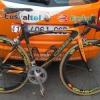Resveratrol is a fairly hot topic these days and many expected we'd see good
life extending effects of mice on a normal diet when being given high doses
of Resveratrol. However it appears this is not the case...but overall health
is generally improved. I haven't got the paper so don't know the details,
the dose or anything.
I wonder if Resveratrol alters core body temperature in rodents? Because
isn't this a quite a big factor in cancer prevention in mice?
And another point, maybe we are still quite a way off from a 'true CR
mimmetic'
Ohwell! I don't take the stuff anyway
Eurekalert.org
Long-term study of middle-aged mice shows
Resveratrol improves health and mimics some benefits of dietary restriction
CAMBRIDGE, Mass., July 3, 2008 -- Sirtris, a GlaxoSmithKline company focused on discovering and developing small molecule drugs to treat diseases of aging such as Type 2 Diabetes, is included among a research team that reported in today's online edition of Cell Metabolism that mice treated at middle-age to the end-of-life with resveratrol showed an overall health improvement, including improved bone health, a reduction in cataracts and cardiovascular dysfunction, and improved balance and motor coordination.
"In this study, we wanted to determine whether or not resveratrol, which imparts many of the same health benefits as caloric restriction in mice, does so by inducing a physiology similar to dietary restriction," says study co-author David Sinclair, Ph.D., a Sirtris co-founder and Harvard Medical School Associate Professor of Pathology. "The data show that resveratrol does induce many similar pathways," says Sinclair, who is co-chair of Sirtris' Scientific Advisory Board. The study was co-led by Rafael de Cabo, Ph.D. at the National Institute on Aging and David Sinclair.
The research team began testing of mice at one year, the mouse equivalent of middle-age, as that is when a small molecule drug mimicking dietary restriction might be given to humans.
The mice were placed on different diets: a standard diet (SD); every-other-day feeding (EOD); and a high-calorie diet (HC). Mice in each dietary regime were divided into treated and untreated subgroups, with some not receiving resveratrol and others receiving different dosage levels of resveratrol.
The study showed that resveratrol induces gene expression patterns in multiple tissues that parallel those induced by dietary restriction, a diet known to slow aging and extend lifespan in rodents and dogs. The study also found a significant increase in lifespan in both the resveratrol treated group on a high-calorie diet and the resveratrol treated group on a calorie restriction diet, but the treatments did not extend lifespan of mice on a standard diet when started at one year of age. This study was funded by the National Institute on Aging.
In developed countries, much of the population now survives to the point where chronic age-associated diseases such as cardiovascular disease, cancer, diabetes, osteoporosis, stroke, and kidney disease are the major determinants of illness and death. Studies in numerous species have demonstrated that a reduction in calorie intake of 30 to 50 percent below normal levels can delay the onset of age-related diseases.
"A small molecule SIRT1 activator that safely mimics the ability of dietary restriction to delay age-related diseases would be of great benefit," says study team member Peter Elliott, Ph.D., Sirtris Senior Vice President of Development.
The research team found that among the notable changes were gene sets representing an increase in mitochondrial gene expression in liver and muscle and a decrease in apoptosis, or cell death, across four of the tissues. The team also found that many genetic pathways were similarly altered by EOD feeding or resveratrol treatment: 82 percent (liver); 76 percent (muscle); 96 percent (fat); and 64 percent (heart). This finding supports the idea that resveratrol can mimic many effects of dietary restriction in vivo.
Specifically, researchers found that resveratrol decreased functional decline often seen in the frail and elderly, such as osteoporosis, cataracts, and motor coordination. For example, in general, femurs from the resveratrol-treated mice trended toward better bone properties, suggested that resveratrol could reduce age-induced bone loss in normal mice. Cataract formation was also lessened by resveratrol in a dose-dependent manner. The mice on a SD treated with resveratrol also showed a significant improvement in balance and motor coordination. The resveratrol treated mice also had improved markers for cardiovascular health. Their arteries were more youthful, and they had reduced aortic stiffness. They also had fewer free radicals and DNA damage.
"Frailty in humans is an important health concern," says Christoph Westphal, M.D., Ph.D., Chief Executive Officer, Sirtris, a GSK Company. "This study informs us how frailty in mice can be delayed, and this knowledge could help us translate preclinical benefits to humans. We are in clinical trials with SRT501, our proprietary formulation of resveratrol that has shown efficacy signs in humans in Phase 1b testing, and we are also testing a novel SIRT1 activator in a human clinical trial."
Edited by Matt, 03 July 2008 - 06:41 PM.
















































